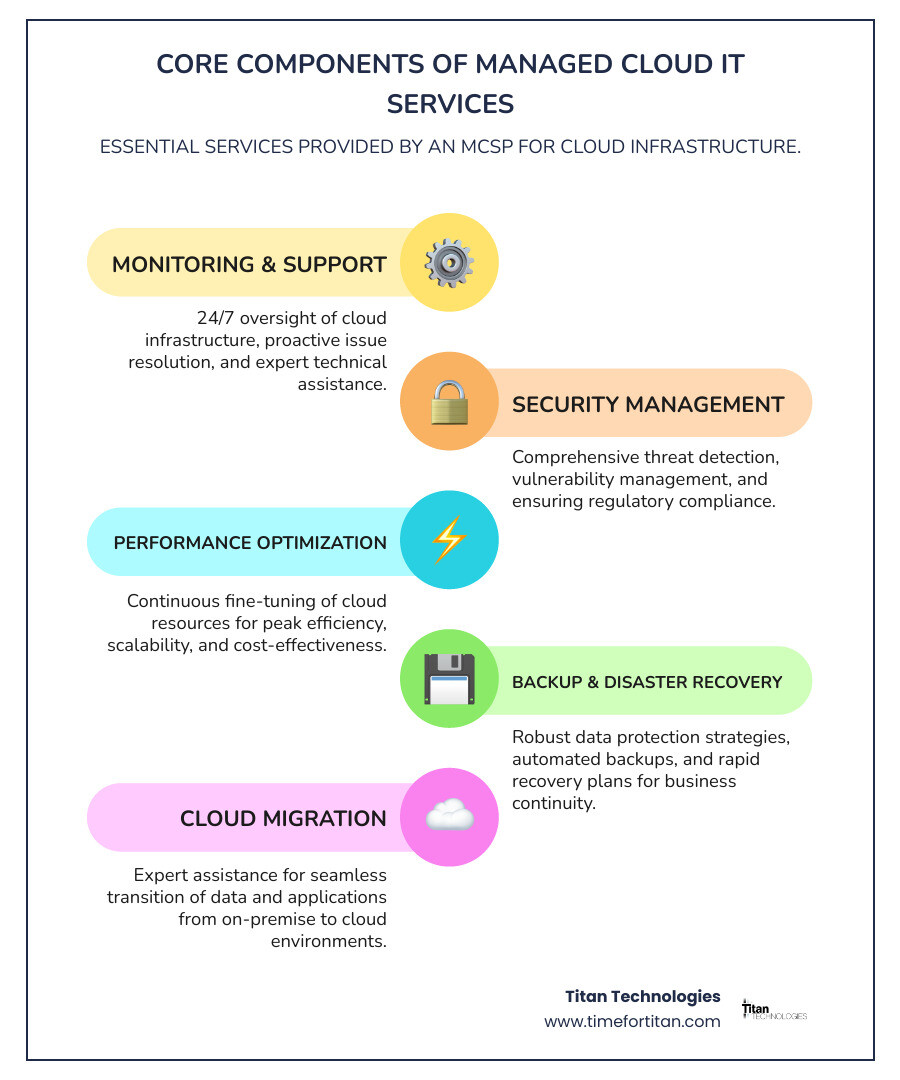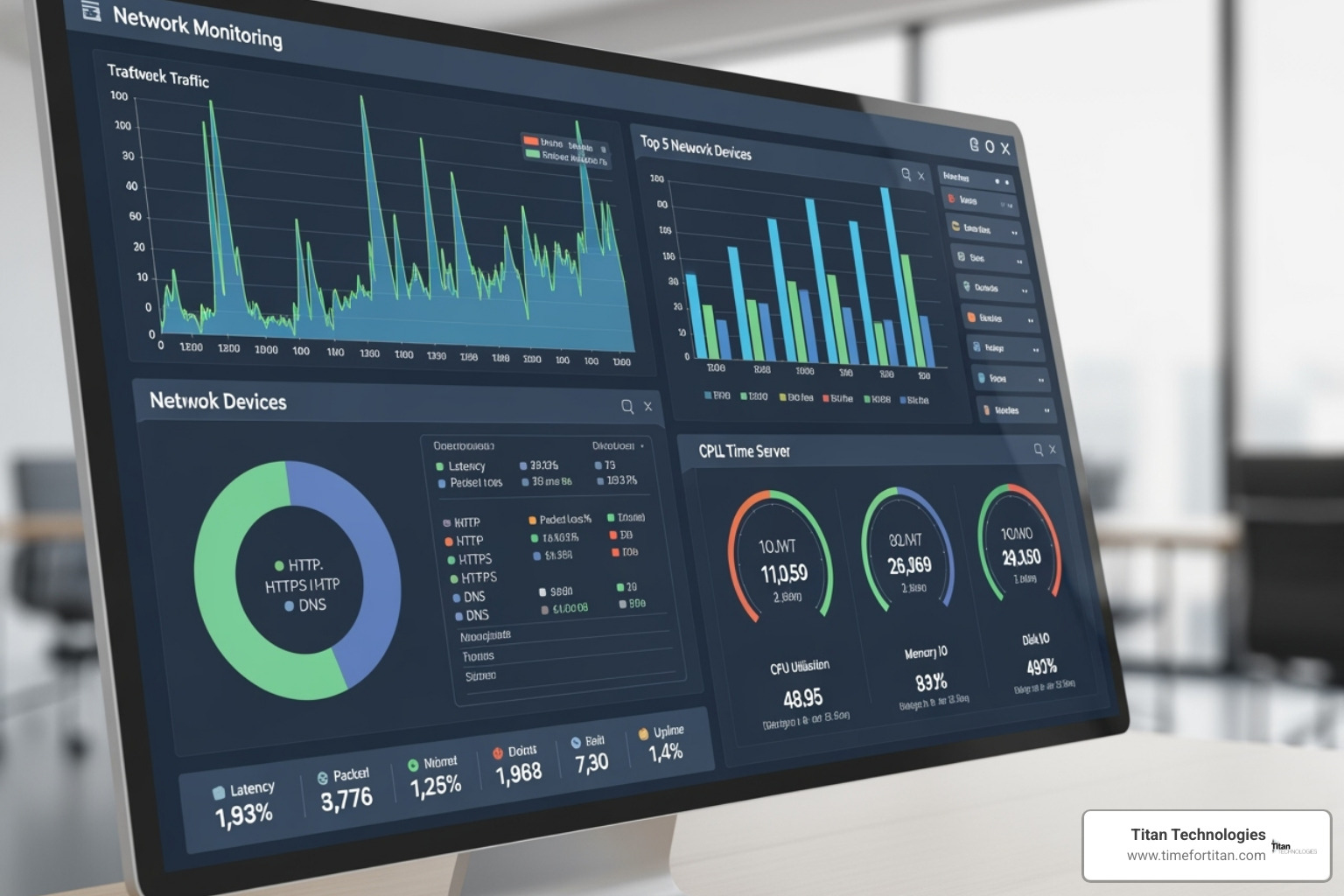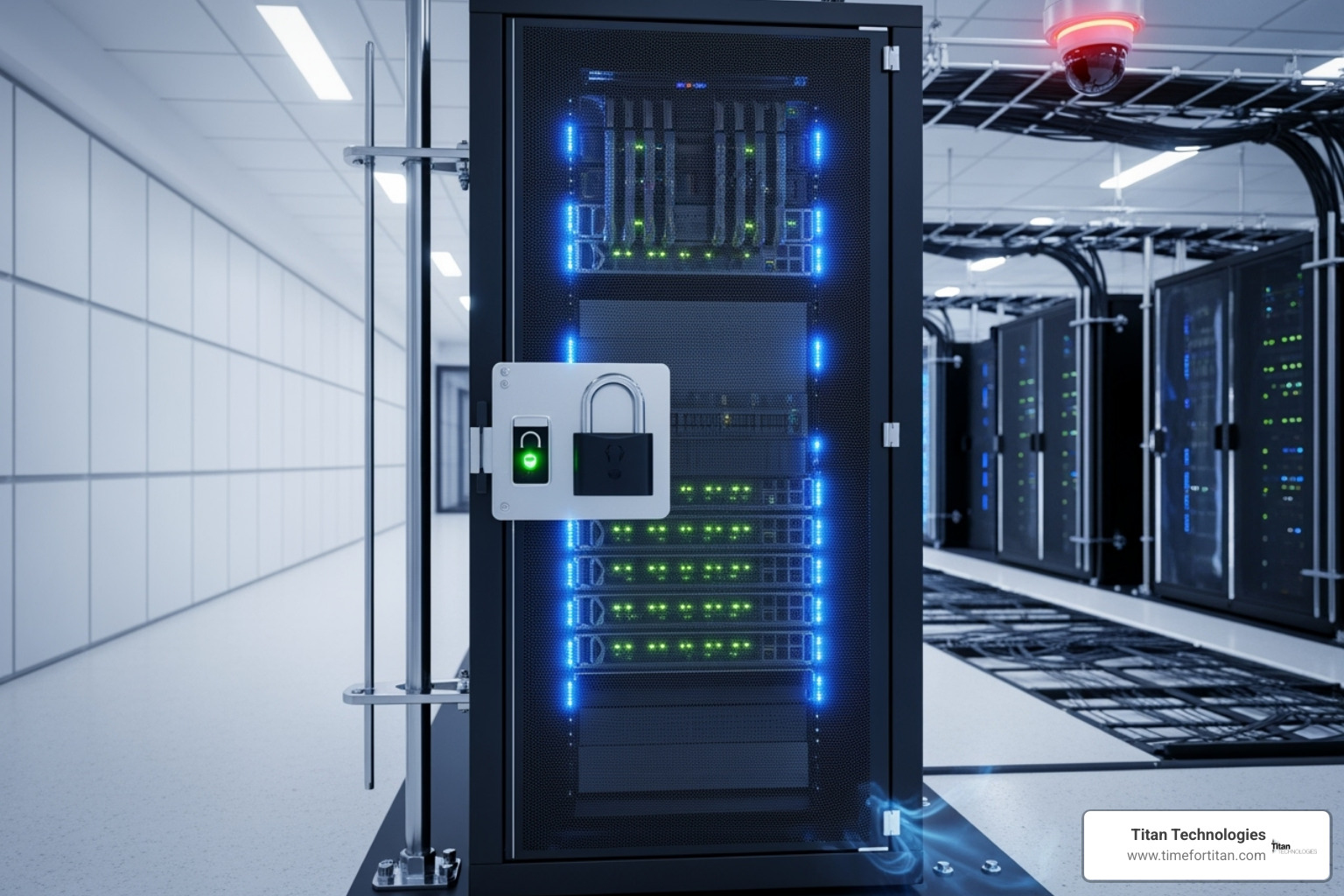What Are Managed Cloud IT Services?

Managed cloud IT services are solutions where a third-party provider handles the partial or complete management of your cloud infrastructure, applications, and operations. This includes migration, configuration, ongoing monitoring, security, and optimization, allowing you to focus on core business functions.
Key Components of Managed Cloud IT Services:
- 24/7 monitoring and support
- Security management, threat detection, and compliance
- Performance and resource optimization
- Backup and disaster recovery
- Cloud migration assistance
- Cost management with predictable pricing
The global managed cloud services market is projected to reach $115.3 billion by 2030. This growth is driven by clear results: businesses using these services see up to a 25% increase in operational efficiency and can reduce IT operational costs by up to 40%.
I’m Paul Nebb, founder of Titan Technologies. With over 15 years of experience in managed cloud IT services, I’ve seen how the right strategy transforms operations and drives growth.

The Shift to Managed Cloud and the Role of an MCSP
Managing IT in-house is increasingly complex and costly, requiring significant capital expenditure (CapEx) that diverts resources from core business functions. Outsourcing to a Managed Cloud Service Provider (MCSP) allows businesses to reclaim that focus. An MCSP is a vendor that manages a client’s cloud resources, acting as a dedicated team that provides:
- Technical Expertise: Access to certified specialists across various cloud platforms.
- 24/7 Support: Proactive monitoring and rapid issue resolution.
- Strategic Guidance: Virtual CIO (vCIO) services for long-term planning and compliance.
- Operations Management: Handling implementation, migration, maintenance, and optimization.
This partnership, guided by IT service management principles, ensures your cloud environment runs efficiently. For more on how this can revolutionize your operations, explore our insights on Cloud Computing Services NJ.
Why Businesses Are Switching to Managed Cloud IT Services
Businesses are switching to managed cloud IT services to gain peace of mind, knowing a team of experts is monitoring their systems around the clock. This allows them to focus on their core mission without being bogged down by technology headaches.

Businesses that adopt managed cloud services see up to a 40% reduction in IT operational costs and a 25% increase in operational efficiency. Key benefits include improved scalability, improved security, greater innovation, and robust business continuity.
Cost-Efficiency and Predictable Spending
Managed cloud IT services shift IT spending from unpredictable capital expenses (CapEx) to predictable operational expenses (OpEx). Instead of large upfront investments, you pay a consistent monthly fee through subscription services.
This model eliminates surprise repair bills and hardware maintenance costs. Flat-rate pricing models provide access to enterprise-level IT for a predictable fee, an ideal solution for growing companies. Our Small Business IT Support NJ services are designed with this philosophy.
Gaining Scalability and Flexibility
Your IT infrastructure must adapt as your business does. Managed cloud services provide on-demand resources, allowing you to instantly scale computing power up or down to meet demand. This is invaluable for businesses with seasonal fluctuations or rapid growth.
This seamless scaling enables true market adaptation. MCSPs excel at orchestrating multi-cloud strategies and hybrid cloud environments (combining public and private clouds) to offer a balance of flexibility and control. Explore how this can benefit your business with our Cloud Services NJ offerings.
Driving Innovation and Improving Customer Experience (CX)
When your team is freed from IT troubleshooting, they can focus on strategic initiatives. Managed cloud IT services create this opportunity for innovation by providing access to advanced tools like AI and analytics, often through platforms like The Microsoft 365 platform.
Faster deployment improves your time to market, while automation-enabled agility reduces human error. This leads to better customer service, a more focused team, and a stronger competitive edge.
Core Functions: What Does a Managed Cloud Provider Actually Do?
A managed cloud IT services provider, or MCSP, acts as your dedicated IT team, working to keep your technology running smoothly so you can focus on your business.
An MCSP’s work centers on proactive monitoring, infrastructure optimization, and expert migration support. They handle all day-to-day management, from software updates to user access. Learn more about network oversight with our Network Management Services.
Typical IT Tasks Handled by an MCSP
An MCSP handles a full suite of tasks for your managed cloud IT services:
- Cloud Deployment and Migration: Planning and executing the migration of applications and data.
- 24/7 Network Monitoring and Support: Ensuring uptime and proactively resolving issues.
- Performance Optimization: Continuously analyzing and tuning the cloud environment for speed.
- Backup and Data Recovery: Implementing robust backup and disaster recovery plans.
- Security Management and Threat Detection: Defending against cyber threats with active monitoring.
- Compliance Reporting: Ensuring your infrastructure meets industry regulations (e.g., HIPAA, PCI-DSS).
- Patch Management and Updates: Keeping all software current with security patches.
- Identity and Access Management: Controlling user access to maintain security.
The Migration and Onboarding Process
A good MCSP ensures a smooth transition. The process is structured to minimize disruption:
- Cloud Strategy Development: Developing a custom cloud strategy based on your business goals.
- Infrastructure Assessment: Reviewing your existing IT setup to design the optimal cloud architecture.
- Migration Planning: Creating a detailed roadmap to move IT assets with zero business interruption.
- Configuration and Testing: Setting up and rigorously testing the new environment to ensure functionality.
- Ongoing Management: Taking over daily monitoring, maintenance, and optimization post-migration.
Our IT Consulting NJ services can guide you through every step.
Fortifying Your Business: Security, Compliance, and Disaster Recovery
With cyber threats on the rise, robust security is non-negotiable. Managed cloud IT services provide enterprise-level security and disaster recovery, including proactive threat detection from 24/7 monitoring systems that neutralize threats before they cause damage.
MCSPs also ensure regulatory compliance (HIPAA, PCI-DSS, GDPR) for businesses handling sensitive data. Learn more in our Cybersecurity Solutions for SMBs.
Key Advantages for Security and Compliance
With managed cloud IT services, you gain access to a team of cybersecurity specialists. Key advantages include:
- Zero Trust Models: Implementing a “trust no one, verify everyone” security model.
- SOC 2 Compliance: Partnering with a certified provider ensures your data is handled according to the highest security standards.
- HIPAA/PCI-DSS Expertise: Configuring your cloud environment to meet strict compliance requirements and avoid fines.
- Vulnerability Patching: Timely application of security patches to close vulnerabilities.
- Managed Antivirus and Spam Protection: 24/7 protection against malware and phishing.
This multi-layered approach combines Network Security with Data Protection Cloud-Based Services.
Ensuring Business Continuity with a Cloud-Based Disaster Recovery Plan
Business continuity is essential for surviving unexpected disasters. Managed cloud services can improve disaster recovery capabilities by 30%, drastically reducing downtime.
Disaster Recovery as a Service (DRaaS) replicates your data and systems to secure cloud locations for quick recovery. This includes:
- Automated Backups: Regular, reliable data backups to multiple locations.
- Rapid Remediation: Restoring data and applications in hours, not days.
- Reduced Downtime: Minimizing financial and reputational losses.
- Data Integrity: Ensuring recovered data is complete and uncorrupted.
A solid Cloud-Based Disaster Recovery Plan prepares you for the unexpected.
Choosing a Partner: What to Look for in a Provider
Finding the right partner for your managed cloud IT services is a critical strategic decision. You need a reliable ally for your operations, security, and growth.
Here’s how the two approaches stack up:
| Aspect | Traditional In-House IT | Managed Cloud Services |
|---|---|---|
| Cost | High CapEx, unpredictable OpEx | Predictable monthly OpEx |
| Expertise | Limited to in-house team | Access to broad, specialized expertise |
| Scalability | Difficult and costly | Highly flexible, on-demand |
| Security | Dependent on internal budget | Proactive, 24/7 security management |
| 24/7 Support | Often limited to business hours | Continuous monitoring and support |
Address potential challenges with a provider that offers transparency and a clear Service Level Agreement (SLA), which should define uptime guarantees, response times, and resolution protocols.
Key Factors for Selecting the Right MCSP
Vetting potential partners on both technical skill and cultural fit:
- Skills and Expertise: Certified experts with deep knowledge of relevant cloud platforms.
- Security Certifications: Credentials like SOC 2 Type II prove a commitment to data protection.
- Industry Experience: A provider with experience in your sector, like IT Services for CPA Firms, understands your unique challenges.
- Client Testimonials: Real-world feedback demonstrates reliability.
- Transparency and Control: A partner who keeps you informed with regular reports and open communication.
- Support Response Times: Fast response and resolution are critical for minimizing disruption.
Understanding Engagement and Pricing Models
Managed cloud IT services offer flexible pricing to fit different needs and budgets:
- Tiered Subscriptions: Plans with clear service levels for a predictable monthly fee.
- Per-User or Per-Device Pricing: A simple model that scales with your business.
- Flat-Rate Monthly Plans: All-inclusive coverage for one monthly fee.
- Bank of Hours: A block of support hours for businesses needing occasional expert backup.
- Custom Pricing: Custom pricing for unique compliance or technology requirements.
Providers of Managed IT Services in Princeton, NJ can help you find a model that fits your budget and growth plans.
Frequently Asked Questions about Managed Cloud Services
Here are answers to common questions about managed cloud IT services.
How do managed cloud services differ from traditional cloud hosting?
Traditional cloud hosting provides raw computing resources (infrastructure), but you are responsible for all management, security, and maintenance. Managed cloud IT services include the infrastructure plus a comprehensive management layer. The provider handles 24/7 monitoring, security, optimization, and support. The key difference is the management layer, which frees your team to focus on strategic goals.
What are the biggest challenges when switching to managed cloud services?
While beneficial, the transition can present challenges. A good partner will address these proactively.
- Finding the Right Provider: Vet providers for technical expertise, industry experience, and security certifications.
- Managing the Migration: A skilled MCSP uses proven methods to ensure a smooth migration with minimal disruption.
- Ensuring Compliance: Verify the provider’s security protocols meet your specific compliance needs (e.g., HIPAA, PCI-DSS).
- Provider Dependency: Reputable providers offer transparent processes and clear exit strategies to mitigate this concern.
Can I use managed services for a hybrid or multi-cloud environment?
Yes. Managing complex hybrid (on-premise and cloud) and multi-cloud (multiple cloud vendors) environments is a key strength of managed cloud IT services. With 70% of organizations using a multi-cloud strategy, managing these platforms in-house is difficult.
An MCSP provides unified management, acting as a single point of contact to integrate and optimize diverse platforms. This simplifies operations and ensures consistent security, freeing your team to focus on strategic projects.
Conclusion: Is It Time to Manage Your Cloud?
The era of wrestling with server maintenance and security worries is ending for businesses that accept managed cloud IT services. Companies that make the switch gain significant cost savings, predictable expenses, and unparalleled scalability.
More importantly, they gain peace of mind with expert security, robust disaster recovery, and the freedom to innovate. The results are clear: significant cost savings, increased operational efficiency, and improved disaster recovery capabilities. Every hour your team spends on IT troubleshooting is an hour not spent growing your business.
The future of IT is about partnering with experts who deliver enterprise-level capabilities, allowing you to focus on what you do best.
For businesses in Central New Jersey seeking a reliable partner, Titan Technologies provides expert Managed IT Services in New Jersey to optimize your cloud infrastructure and secure your operations.
The question isn’t if managed cloud services are right for your business—it’s whether you can afford to wait.







